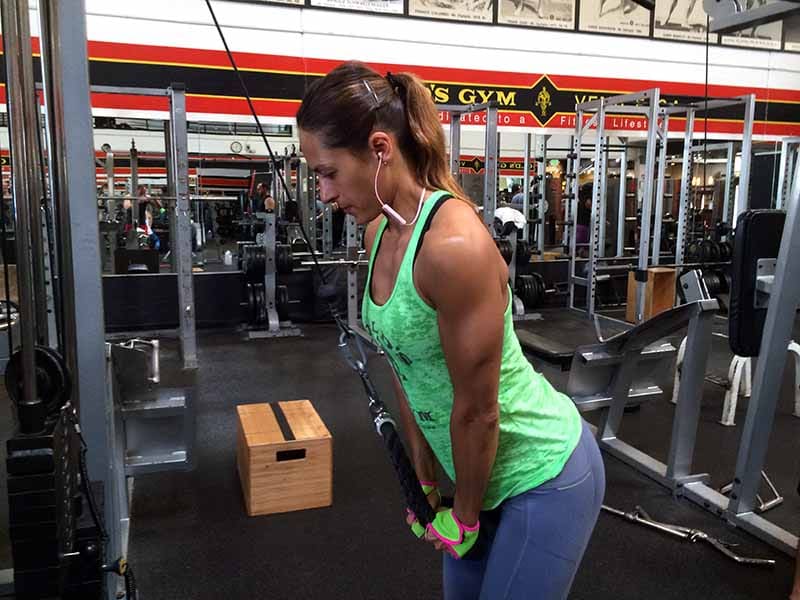For those who repeatedly do cardio (like working, swimming, dancing, and so on.), you’ve gotten most likely observed that your blood sugar reacts in a different way relying on the kind of cardio.
Whereas steady-state cardio will often make your blood sugar drop, interval coaching could make it improve.
The identical goes for resistance coaching (weight lifting) and blood sugar. Some forms of resistance coaching will make your blood sugars improve!
On this publish, I’ll speak about how several types of resistance coaching have an effect on your blood sugar and the methods you possibly can attempt to proactively handle your blood sugar throughout and after resistance coaching.
At all times focus on modifications to your insulin doses together with your medical crew. Since we’re all just a little totally different, you could want to regulate in a different way for train than I do.
Why resistance coaching is nice for individuals with diabetes
I completely love resistance coaching for 3 causes:
- Resistance coaching makes me really feel robust and empowered.
- Resistance coaching has helped me form my physique to my liking.
- Resistance coaching finally makes my diabetes simpler to handle, because it improves my physique’s skill to make the most of insulin.
Resistance coaching usually falls into two classes
- Low-rep (heavy) coaching with pauses between every set.
- Excessive-rep coaching or supersets with little relaxation between units. Your coronary heart fee is elevated all through the exercise.
Every kind of resistance coaching will have an effect on my blood sugar just a little in a different way throughout my exercises however they each have the identical long-term good thing about a considerably improved insulin sensitivity.
How high-rep resistance exercises have an effect on my blood sugar
Normally, I should be just a little extra cautious and watch my sugars extra carefully if I do high-rep exercises, supersets, or quite a lot of compound leg workouts (like squats, deadlifts, or lunges).
These sorts of exercises can have a cardio-like (cardio) influence on my blood sugar since my coronary heart fee can be elevated for a lot of the session and I can anticipate my blood sugar to drop.
I deal with periods like these virtually as I might deal with steady-state cardio – by lowering my pre-workout insulin dose by about 30%-50%.
How low-rep resistance exercises have an effect on my blood sugar
On the subject of extra conventional resistance coaching with fewer reps (lower than about 12 reps per set), the state of affairs is just a little totally different. When doing exercises like this, I typically see my blood sugar go up, and typically I don’t see a lot of an influence in any respect. It comes all the way down to what physique half I’m coaching.
For smaller muscle teams like arms and shoulders, my coronary heart fee received’t often improve that a lot regardless of the heavy weights, and my blood sugar will stay secure. If I do heavy chest, again, or leg exercises, nonetheless, I’ll most definitely see an influence on my blood sugar, and it could typically be a rise. My physique reacts in the identical approach as once I do an interval cardio exercise.
Given this information, I’ll cut back my pre-workout insulin dose minimally or under no circumstances for a low-rep exercise, relying on the physique elements I’m coaching.

Find out how to put together for resistance coaching and forestall post-workout lows
On the subject of resistance coaching, pre-workout meals play an enormous position in whether or not you’ll achieve success within the fitness center. I at all times eat one thing earlier than and after a strength-training exercise to make sure I’ve sufficient vitality to do the exercise, rebuild my muscle mass, and preserve good blood sugar ranges.
My pre-workout snack is a reasonably low glycemic carb (like brown rice) and a few lean protein (like rooster breast) which I eat about an hour earlier than my exercise. By consuming a low glycemic carb and a few protein, I get sufficient vitality for my exercise with out having to take quite a lot of insulin.
My post-workout snack consists of a low or high-glycemic carb with an simply digested protein (like fruit and a whey protein shake).
As talked about, I usually cut back my insulin dose for the pre- and post-workout meals by as much as 50%, particularly on high-rep and superset days, because of the cardiovascular (cardio) part of the exercise, which at all times makes my blood sugar drop.
Nonetheless, taking a little bit of insulin earlier than a resistance coaching exercise additionally has the profit that it reduces my threat of excessive blood sugar in the course of the low-rep periods.
Find out how to alter your insulin as much as 36 hours after a resistance exercise
My method to insulin changes for the 24 to 36 hours after I go away the fitness center is similar it doesn’t matter what type of resistance coaching I’ve finished.
What occurs whenever you do resistance coaching is that you just create microscopic tears in your muscle fibers, and for the subsequent 24 to 36 hours, your muscle mass heal and get greater and stronger. Throughout this era, your muscle mass want vitality to heal and that has to come back from someplace, so low blood sugars can simply be the consequence if I don’t plan forward.
If I do resistance coaching lower than 4 instances per week, I’ll usually have to scale back my nighttime basal insulin by as much as 50% on the times on which I work out (that is totally different for each particular person so you might want to experiment and observe your outcomes to search out what works greatest for you).
If I do resistance coaching greater than 4 instances per week, the elevated insulin sensitivity is current on a regular basis and I can merely decrease my nighttime basal completely with out having to regulate for particular person exercises.
Observe: For those who do resistance work to the purpose of extreme or delayed soreness, you possibly can truly improve insulin resistance. If the muscle mass are being repaired for a number of days because of excessive injury, you possibly can’t restore glycogen in them till the restore is completed, and that causes insulin resistance.
Abstract
I discover it simpler to regulate for resistance coaching than for cardio, so long as I’m very conscious of the type of resistance coaching I’m doing and keep in mind these pointers:
- Excessive-rep exercises during which your coronary heart fee is elevated will most definitely make your blood sugar drop.
- Low-rep exercises that don’t elevate your coronary heart fee considerably (like arms or shoulders) most definitely received’t have an effect on your blood sugar.
- Laborious low-rep exercises of huge muscle teams can have an effect on your blood sugar like an interval exercise, probably resulting in a rise in blood sugar.
- Don’t be afraid of consuming!!! Eat sufficient lean protein and carbs to gasoline your exercise, guarantee muscle restoration, and (with the suitable insulin dose) stabilize your blood sugar ranges.
- Think about lowering your insulin ranges appropriately in the course of the 24 to 36 hours after a exercise to regulate for the kind of resistance coaching you’ve finished.
Have enjoyable within the fitness center!












